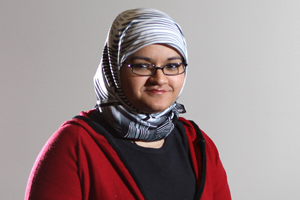Opinion: Just another reason to choose free trade products
Fiza Shah
Fiza Shah is freshman integrated language arts major and columnist for the Daily Kent Stater. Contact her at [email protected].
The hot sun beats down on the hunched backs of children in the cocoa fields.
Their small hands harvest brown-colored beans worth more than their lives. They work almost 12 hours a day.
The grooves on their chocolate-colored backs — created by twigs from surrounding trees, whips or bicycle chains — don’t spell Hershey, but rather serve as a permanent visual for the bitterness of the chocolate industry.
Most Americans would be disgusted by the idea of a child living in such conditions. When it’s brought up in conversation, they might even spend a few minutes vocalizing their outrage.
However, with the passage of time, the conversations always quiet down, as does the rage.
Eventually, everything returns to normal.
Parents once again reward little girls with chocolate ice cream, made with beans picked by an orphaned, illiterate, African child.
But, this shouldn’t be the case.
Our guilt and outrage shouldn’t be determined by our own convenience. It’s convenient to be angry during a conversation with a friend about child labor, but not so much at the grocery store.
If people continue to financially support such countries, children will continue to be taken from their homes and enslaved.
One such child is Aly Diabate, who at 12 years old was tricked into slavery.
He was promised a bicycle and $150 to support his parents if he would just work on the cocoa bean farm. But instead of scraped knees from falling off of a bicycle, he was given a blood soaked back from being flogged with a bicycle chain.
“The beatings were a part of my life,” Aly said. “Anytime they loaded you with bags and you fell while carrying them, nobody helped you. Instead, they beat you and beat you until you picked it up again.”
This place is called the Ivory Coast, according to StopChocolateSlavery, a website run by the University of California, San Diego.
The site is dedicated to spreading awareness about this arcane and inhumane practice.
According to the UCSD site, 43 percent of all cocoa beans in the world come from the Ivory Coast. Many of these farms use children between the ages of 12 to 16 as slaves.
By the time the beans reach the individual companies, those picked by slaves are mixed in with those picked by paid labor.
Most of us don’t consider child slavery when they are buying a Hershey’s candy bar. I know I didn’t, but I should. We should.
Rather than voicing outrage at the actions of such companies, we need to actively boycott these practices.
Rather than buying chocolate form companies such as Hershey’s, M&M/Mars and Nestle, buy products that have a Free Trade label on it. This label means that slave labor has not been used at any time to produce the product.
This way, you can enjoy your sweet treat without the residual bitter feeling of guilt.



